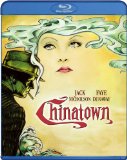| Reviews & Columns |
|
Reviews DVD TV on DVD Blu-ray 4K UHD International DVDs In Theaters Reviews by Studio Video Games Features Collector Series DVDs Easter Egg Database Interviews DVD Talk Radio Feature Articles Columns Anime Talk DVD Savant Horror DVDs The M.O.D. Squad Art House HD Talk Silent DVD
|
DVD Talk Forum |
|
|
| Resources |
|
DVD Price Search Customer Service #'s RCE Info Links |
|
Columns
|
|
|
Chinatown
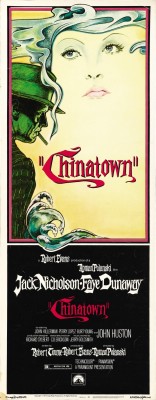
Please Note: The screen captures used here are taken from promotional materials and the 2009 DVD release, not the Blu-ray edition under review.
"No question from you is innocent, Mr. Gittes." - Evelyn Mulwray (Faye Dunaway) to Jake Gittes (Jack Nicholson) in Chinatown
None of the questions raised in Chinatown's unfolding, eventually all-encompassing mystery/detective story is as innocent as it first seems, either. Not that the assumptions held by our Depression-era L.A. gumshoe, the thick-skinned and wised-up (or so he thinks) J.J. "Jake" Gittes, are innocent to begin with: adultery, corruption, double-crossing betrayal, and violence are all mundane, par for the course in the world he lives in. But what marks Chinatown, regardless of its exquisitely precise period trappings, as a product not of the '30s but of the weary, confounded, despairing Vietnam/Watergate era goes well beyond its nonchalantly frank sex 'n violence, its visual fluidity, color, and its Cinemascope presentation. What might at first feel like the film's standard-issue detective-noir murder mystery goes much further, higher up, and lower down than our intrepid, self-assured protagonist could ever have suspected at the beginning; the revelation that lies in wait for him is one that even the impoverished and discouraged America of the Depression years would have balked at, but the America of 1974 was much better prepared for it. The solution to the film's mystery answers all the questions, but it resolves nothing, serving instead to tear an irreparable hole in the veil of even Mr. Jake Gittes's tough-guy, "disillusioned" illusion to reveal something worse than he (or we) could have ever imagined.
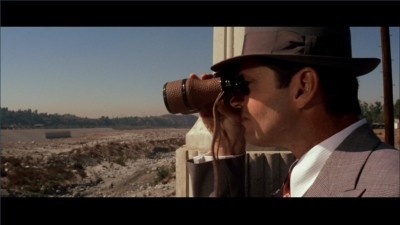
Gittes's first toe-dip into the plot's very deep, dark water occurs through a typical, tedious cheating-husband case. He is instructed by an affluent-appearing middle-aged lady (Diane Ladd) to snoop on her husband and find out what extramarital dalliances he might be up to; the only unusual thing is that this allegedly wayward husband is Hollis Mulwray (Darrell Zwerling), chief engineer at the Los Angeles Department of Water and Power. What Gittes sees as he spies on Mulwray is curious; the man seems obsessed with the city's water supply, and what appear to be his tenderly amorous visits to a charming young lady (Belinda Palmer) are not at all foremost on his schedule. When Mulwray's actual wife, Evelyn Cross Mulwray (Faye Dunaway), shows up after Gittes's photos of Mulwray and his ostensible mistress appear on the front page to angrily inform the detective that the woman who hired him was an impostor, Jake is not only intrigued by the stunning beauty of the authentic Mrs. Mulwray but haunted by the feeling that something not quite right (and much bigger than his usual small-potatoes work) is going on.
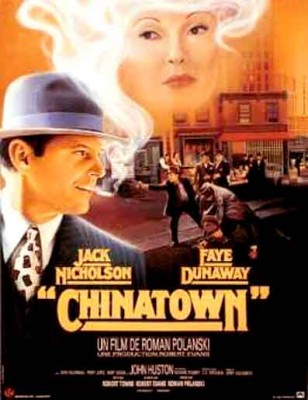
We discover that Jake used to work in the LAPD until something horrible happened in his former beat, the city's seedy Chinatown, to a woman he loved because of his inadvertently destructive heroics; it would seem that curiosity, his need to get to the bottom of things and uncover the truth, has already taken eight of this cat's nine lives. But Gittes now becomes hellbent on using up the one he has left trying to answer the obsession-germinating questions raised by the lovely and mysterious femme fatale (or is she?) Mrs. Mulwray, particularly after her husband's ghoulishly apt drowning death. Who was that young woman the late Mr. Mulwray was apparently involved with, who is now being kept, apparently against her will, in an anonymous safe house by his widow? What is the significance of the fact that Evelyn's father, Noah Cross (an unforgettably folksy-diabolical John Huston) and her late husband used to be partners in the city's privately-held water utility until Mr. Mulwray benevolently, socialistically decided that water is a public good and should be owned by the people, thwarting Mr. Cross's empire-building capitalist and turning father and father-in-law into enemies? Is Evelyn Mulwray a scheming, murderous temptress or a victim in a tragic scenario that, in its simultaneous vastness of scope/ambition and primal, grotesque personal violations, it would not be going too far to characterize as biblical? And if she is a victim, will Jake be able to save her, or is he doomed to repeat his history of miserably failed rescue/redemption missions?
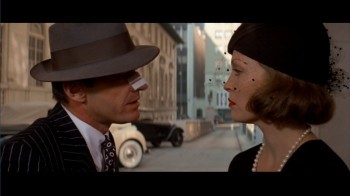
The storied brilliance of the film's scenario and script by legendary screenwriter Robert Towne really doesn't ever cease to amaze. Like its noir predecessor, The Big Sleep, it's unapologetically convoluted, even confusing, but that's somehow not only strangely satisfying but an integral part of its allure; unlike those of The Big Sleep, however, Chinatown's puzzle pieces actually do ultimately fit together to create a very symmetrical, complete, cohesive (if horrifying) picture. Director Roman Polanski (Rosemary's Baby, Cul-de-sac) brings all the best of his considerable artistry to bear on realizing Townes's scriptwriting masterpiece in what has to be one of the most fruitful collaborations in cinema history. As realized by Polanski, the picture perfectly toes the fine line dividing well-honed stylishness from superficial postmodern stylization; we are immersed, and nothing in the film is ever placed between quotes to make it wink and nudge at us. All the meticulous period detail of set and costume are not undermined but rather enhanced by Polanski's potentially incongruous, in practice magnificently complementary starkness and eccentric naturalism of visual sensibility and dramatic tone. Director and star clearly share a mordant sense of humor (most forthrightly on display in Polanski's cameo as a switchblade-wielding tough), which gives the film yet another layer that, like just the right amount of spice in a well-prepared dish, doesn't efface but instead brings out all of its many other nuances and flavors.
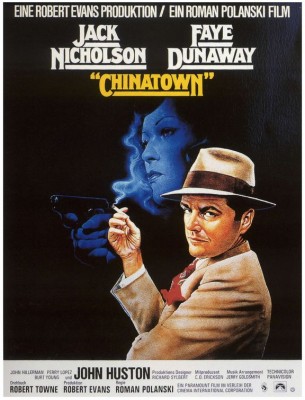
In 1974, Chinatown was riding the crest of a wave of brilliant American-cinematic repositories of disaffected, smart, inspired, innovative, sophisticated, and artistically exuberant masterpieces (The Long Goodbye, The Conversation, et. al), and it remains in retrospect definitive of both the genre, long thought moribund, that it astonishingly resurrected and of the newly bold, ambitious, intelligent kind of film that, through an accidental confluence of economic, cultural, and corporate factors for which cinephiles everywhere remain eternally grateful, was somehow more or less routinely being created at the time under the auspices of the burnt-out shell of the Hollywood studio system. It remains an endlessly rewatchable film, one whose Holy-Grail influence continues to reverberate through our more serious, thoughtful, artistically inclined filmmakers (L.A. Confidential is its most obvious successor, but its touchstone effect on something like There Will Be Blood goes well beyond Daniel Day-Lewis's John Huston-reminiscent physicality and vocal inflections, straight to the heart of its big-theme aspirations). The water that serves as the center of Chinatown's story may flow through channels of insidious corruption and under the toxic shadow of the most unpleasant nascent (we hope) evils of human nature; as a wellspring of cinematic inspiration, however, it's forever clear, pure, refreshing, and revivifying.
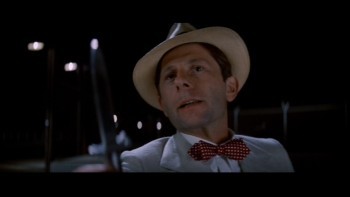
THE BLU-RAY DISC:
Here is where the Blu-ray version of Chinatown will be torn between two videophile factions: those "grain monks" (I would probably include myself among them) who crave the texture of celluloid and do not consider its natural "grain" anything like a flaw or glitch but rather something highly desirable in a transfer and those who want the shinier, flatter, more "pristine" look resulting from the digital noise reduction (DNR) process when it's taken too far. (One wants flaws removed; one doesn't want an innate visual attribute of the film thrown out like the proverbial baby with the bathwater.) The AVC/MPEG-4, 1080/24p, 2.35:1 aspect-ratio transfer looks beautiful, but the question will be, does it look right, i.e., as close as possible to a well-preserved print actually projected on film in ideal conditions? The good news is, Paramount (apparently working from the same print they used for the last round of upgraded Chinatown DVDs) has not removed every last trace of film grain, so the transfer does appear sufficiently cinematic, though perhaps not as much so as it should. But they may have erred in the way that's inevitable when you try to please everyone and thereby please no-one. The ultimate result is that, no matter which side of the DNR fence you fall on, this transfer has tried to split the difference and sits so squarely and stubbornly on that fence that it can only be considered good, not great.
Sound:I will focus only on the disc's two English-language options, which, like the PQ, put the film as it exists in this release at a (more minor) flashpoint in discussions and controversies that erupt when a classic film like Chinatown is put out on new digital media. I'm personally much less ambivalent about the choice between the disc's two audio options than I am about the perhaps overenthusiastic "clean-up" job on the picture: Both the DTS-HD Master Audio 5.1 surround soundtrack and the original mono soundtrack restored in TrueHD have no glitches such as distortion or volume-level imbalances to speak of, but I would never choose anything but the mono, since it's how the movie was made to sound. The choice will be up to the individual viewer, and I did try the 5.1 soundtrack at intervals to see if I could hear the difference. The difference is that the sound, though crystal clear, is too spread out in every direction, which is the legitimate goal of surround sound but it is not how the film really sounds, so it just doesn't seem to match or feel right. I would strongly advise sticking to the mono, and I'm grateful that Paramount has continued to offer that as an option on this Blu-ray edition.
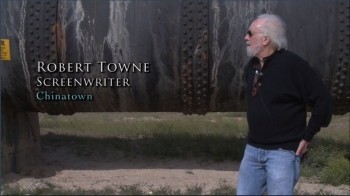
The bonus features from the 2009 "Centennial Edition" DVD have been carried over in their entirety to this new Blu-ray release, including:
--A feature commentary with well-regarded director-in-his-own-right David Fincher (Zodiac) bouncing his enthusiastically well-studied questions off of screenwriter Robert Towne in a convivial back-and-forth that's rife with technical/filmmaking observation and lore (both from the making of the film and from Towne's research), with the occasional sense (not entirely without its charm and interest) that Towne is the tolerant elder statesman here, putting up kindly with Fincher's fanboy-hyperbolic, obsessive effusiveness, which, given Fincher's notoriously demanding and recalcitrant personality, is a side one rarely thinks of, let alone actually gets to experience, in association with Hollywood's most reclusive and persnickety maker of atypically ambitious/intellectual prestige pictures.
--The feature-length documentary Water and Power, in which Chinatown screenwriter/amateur L.A. historian Robert Towne visits William Mulholland and Co.'s famous aqueduct (the massive engineering project/capitalist land-grab that inspired the biggest of Chinatown's perpetually, vertiginously expanding pictures), and in which we are given--via archival photos, many up-close views of the conveyance systems that hydrate L.A., and bounteous interviews with historians, activists, and officials--the fascinating past, present, and possible futures of how the City of Angels gets the basis of all life channeled in through the surrounding desert.
--"Chinatown: An Appreciation", a half-hour video program that gathers together a diverse panel of Chinatown fans who are also filmmakers--directors Kimberly Peirce (Boys Don't Cry) and Steven Soderbergh (Che) along with cinematographer Roger Deakins (Barton Fink, Revolutionary Road)--and gets their sometimes intriguingly idiosyncratic and always very thoughtful, engaged, and well-articulated thoughts, opinions, and interpretations regarding the film. This supplement is long enough, and the group of commentators small enough, that it provides an unusually in-depth and well-considered glimpse of Chinatown through eyes that are uniquely qualified to enumerate and describe its seemingly bottomless supply of qualities and meanings.
--A trilogy of short supplements pieced together from the same interview footage of the main players. "Chinatown: The Beginning and the End" (20 min.): Polanski, Towne, producer Robert Evans, and Nicholson, interviewed separately, recall (sometimes in interestingly conflicting ways) the pre-production process, casting, Polanski's reluctance to return to L.A. to make the film, etc. as well as some in-depth discussion of the often contentious process Polanski and Towne went through in honing Towne's script; "Chinatown: The Filming" (25 min.), in which it's Nicholson and Polanski's turn to discuss their long-running friendship and their sometimes explosive on-set creative-differences battles (as well as the fragility and demandingness of Dunaway, whom everyone fawns over but who does not appear here); and finally, "Chinatown: The Legacy" (10 min.), in which the gang discuss how unexpected it was that something so arty, complicated, and "intellectual" and would become such a critical darling and box-office success.
--Lastly, the theatrical trailer and a small, short, but nicely-designed booklet with glossy stills and some brief but densely detailed background on the film's historical context are the cherries on this king-size extras sundae.
FINAL THOUGHTS:Roman Polanski's Chinatown has to be placed in the exceptional, essential company of Klute, McCabe and Mrs. Miller, and The Last Picture Show; it's one of the most exhilarating classics of that darker, richer, revisionist '70s American cinema that has come to be revered as Hollywood's final Golden Age. Its amazing and beautiful movement--stepping gradually but steadily back from a little dot in the mosaic (in the form of Jack Nicholson's wise-ass but not as smart as he thinks Jake Gittes) and finally revealing its big picture--the ruthless, boundless greed and still darker, more corrosive, more primal unmentionables of westward expansion's last gasp--has to be one of the most ingenious dramatic/suspense mechanisms ever to emerge from the mind of a screenwriter. A uniformly excellent, inspired, risk-taking cast and crew--from Polanski, Nicholson, Dunaway, and Huston on down through the D.P. and editor to the set builders and decorators--breathe bleak, gritty, yet romantically melancholy life into it, making it a picture that displays the most remarkable signs of cinematic vitality as its confirmed-paranoia nightmare of ideals betrayed and impotence in the face of forces bigger than any knight in shining armor comes inexorably truer and truer. If not for the somewhat iffy, overly-spruced-up visual treatment that this new Blu-ray edition holds over from prior DVD versions, it would easily be a Collector Series title. For now, until the studio springs for a treatment that's more conscientious about leaving the film's cinematic texture intact, it comes Highly Recommended. Since nobody knows how long it will take for that to happen, and because this disc does still offer the Blu-ray benefits of increased sharpness/clarity/vividness, you really should treat yourself in the meantime, because any home movie library worth its salt has a gap that only Chinatown can fill.
|
| Popular Reviews |
| Sponsored Links |
|
|
| Sponsored Links |
|
|
| Release List | Reviews | Shop | Newsletter | Forum | DVD Giveaways | Blu-Ray | Advertise |
|
Copyright 2024 DVDTalk.com All Rights Reserved. Legal Info, Privacy Policy, Terms of Use,
Manage Preferences,
Your Privacy Choices | |||||||









